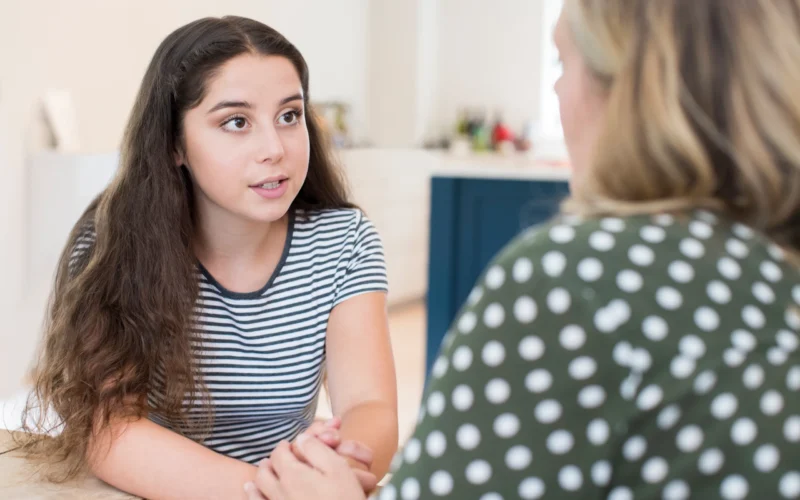I started college when I was 17. Well, briefly; the school term started a few days before my 18th birthday. While I didn’t have to make it very far into college as a minor, for those few days I was very aware of the fact that if my parents needed to sign something for me, the 600-mile separation would make it a hassle. Things I could have needed parent permission for included signing a waiver (such as for a self-defense class), buying cough medicine, buying super glue, getting a piercing, and donating blood.
The reason? These are all things that could potentially have caused me harm, and as a not-quite-yet adult, I was subject to laws put in place to ensure that an adult with my best interests at heart could consider and weigh these risks.
Something that was notably absent from this list however, was access to birth control. This is because the vast majority of states allow under-18s to be prescribed birth control without parental consent. The exceptions include Delaware and Illinois (must be at least 12 years old), Alabama and Hawaii (must be at least 14 years old), and South Carolina (must be at least 16 years old), although exceptions are possible where youth can still obtain birth control without parental consent. In Delaware, Hawaii, Kentucky, Maine, Maryland, Minnesota, Montana, and Oregon, healthcare providers can elija to inform a parent or legal guardian that a child has been prescribed birth control, but this notification is not required.
What is the argument para allowing minors to access birth control without telling their parents?
In a hypothetical situation, let’s say Samantha approaches her parents about getting medical treatment for frequent migraines. Her parents are supportive. It’s clear why Samantha wants to do this, and they too want her to feel better and not have to miss so much school. They are able to help her weigh the risks and benefits of the options available to her, evaluate options other than medication, consider options in light of personal and family medical history, and navigate insurance.
While Samantha is grateful to have her parents help her find migraine treatment, she might not be so keen on broaching the subject of birth control with her parents. Since birth control is necessarily associated with sex, she might be afraid of implying that she is sexually active by asking about birth control, even if she is interested in birth control for non-contraceptive reasons. More likely than not, sex and reproductive health are taboo topics in her house, and trying to start a conversation about birth control could result in embarrassment, shame, or even an angry outburst from a parent.
For the majority of states that do not require parental consent for birth control, their reasoning is pretty straightforward. If a minor is choosing to engage in sexual activity, then denying her the ability to use contraceptives puts her at undue risk for teen pregnancy. According to the accepted script around birth control, it is safe with few side effects while unintended pregnancy can have a profound impact on a teen’s life. The argument is that the benefits of birth control strongly outweigh the risks, so minors should be able to make the decision themselves.
What is the argument contra allowing minors to access birth control without telling their parents?
In reality, it’s past time to question the supposed harmlessness of birth control. We’ve recently covered the stories of Cloe Westerway, whose birth control implant migrated all the way into her heart, and Layla Khan, a 16-year-old girl who tragically died of a blood clot caused by hormonal birth control. And while deadly or life-threatening birth control complications are rare, an estimated 300-400 U.S. women lose their lives each year from venous thromboembolisms, strokes, or heart attacks directly caused by their hormonal birth control use. Furthermore, the “typical” side effects of birth control can also seriously impact quality of life.
Without guidance, teens may have difficulty navigating these potential side effects, like depresión, especially when parents aren’t even aware of their child’s prescription. In the case of complications, teens may be forced to enlist their parents’ help anyways, as in esta historia of an improperly inserted Nexplanon. Bizarrely, parental consent was required to eliminar the Nexplanon implant, even though it was inserted without parental notification.
Furthermore, harmful complications could arise for youth who aren’t aware of whether their personal or family medical history would preclude or complicate combined oral contraceptive use. This includes women with high blood pressure, diabetes, smoking, certain heart conditions, migraines with auras, cancer, liver problems, genetic factors that make abnormal blood clots more likely, or for those who take medications that interact with hormonal birth control [1].
Legislation increasingly trends toward less oversight for hormonal birth control
Since birth control is often held up as a reproductive right, legislation continues to favor less oversight for birth control in favor of increased accessibility. Many states now allow patients to get birth control prescribed by a pharmacist without seeing a primary care provider. Opill will soon be available over-the-counter. Depending on how individual pharmacies choose to market and sell Opill (and any future iterations of OTC birth control) customers will potentially be able to purchase hormonal birth control without so much as a conversation with a medical professional.
It’s worth saying again that hormonal contraception has a profound effect on the body, especially for adolescentes, and it’s not a medical decision to be taken lightly. The accepted script surrounding birth control’s effectiveness at “protecting” teens also merits a challenge, as there is pruebas to suggest that access to birth control makes teens “three times more likely to have an STD, have PID, and to become pregnant, and, surprisingly, ten times more likely of having an abortion compared to noncontracepting adolescents” [2]. Without guidance from parents or a doctor, teens seeking birth control will likely be unaware of these potential risks and side effects.
Well then, are we just supposed to let teens get pregnant?
No, absolutely not! Arguments around birth control are often painted as a black-and-white dichotomy between allowing unregulated birth control or allowing a rise in unintended pregnancy. These are not the only two options, and both dismiss teens’ abilities to make smart decisions regarding sex when adults are open to thoughtful conversations with them regarding the risks and pitfalls of early sexual activity (which are covered in more depth throughout our Teens and Sex series).
A key alternative to promoting youth access to birth control is promoting fertility awareness education. To be clear, we’re not talking about teaching teens a formal fertility awareness method or method of Natural Family Planning, which can be used to achieve or avoid pregnancy. Instead, we advocate for a body literacy education that helps teens understand the dignity of their bodies, which empowers them with the self confidence needed to make smart decisions surrounding sex. In fact, there is evidence to suggest that age-appropriate fertility awareness instruction helps teens delay sexual activity and/or cease it altogether.
Furthermore, not all teens seek out birth control for contraceptive purposes. Many teens want options for treating acné, periodos dolorososo periodos irregulares, and are directed by their doctors to utilize birth control for those purposes. But what many teens (and their doctors) do not realize, is that these conditions can be treated sin birth control or may require further investigation to really treat and not just cover up symptoms. Fertility awareness can help young women especially to understand their bodies and to figure out when something is wrong. (If you are interested in helping your daughter understand her cycle and embrace her feminine body, we encourage you to check out our Mothers of (Pre) Teens online course.)
The most important thing a parent can do to prevent teen pregnancy
Parental consent for teen birth control use is just one small piece of a bigger picture, and that’s this: minor children need their parents’ active involvement in many aspects of their lives, especially when it comes to sexuality. My recommendation to parents of teens is to make your home a safe place for asking questions and having deep conversations about sex, relationships, and reproductive health. There is a big difference between being open about sexual activity and being open to talking about sex. One does not imply the other. While it may require some research, soul- searching, and working through your own issues regarding sex, being able to offer guidance and explain the “why” behind your views on sex and birth control in a calm and measured way is invaluable to your teen and an advantage that, sadly, not many teens have access to.
Referencias:
[1] Cooper DB, Patel P, Mahdy H. Oral Contraceptive Pills. [Updated 2022 Nov 24]. In: StatPearls [Internet]. Treasure Island (FL): StatPearls Publishing; 2024 Jan-. Available from: https://www.ncbi.nlm.nih.gov/books/NBK430882/ [2] Fehring RJ, Bouchard T, Meyers M. Influence of Contraception Use on the Reproductive Health of Adolescents and Young Adults. The Linacre Quarterly. 2018;85(2):167-177. doi:10.1177/0024363918770462Lecturas complementarias:
Cause or cure?: Why birth control isn’t the best cure for teen acne











